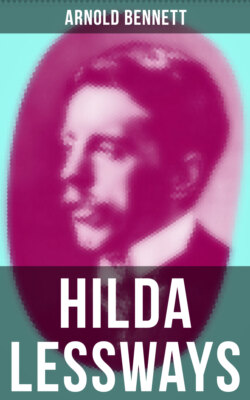Читать книгу HILDA LESSWAYS - Arnold Bennett - Страница 25
На сайте Литреса книга снята с продажи.
i
ОглавлениеThe next morning, Saturday, Hilda ran no risk in visiting Mr. Cannon. Her mother’s cold, after a fictitious improvement, had assumed an aggravated form in order to prove that not with impunity may nature be flouted in unheated October drawing-rooms; and Hilda had been requested to go to market alone. She was free. And even supposing that the visit should be observed by the curious, nobody would attach any importance to it, because everybody would soon be aware that Mr. Cannon had assumed charge of the Calder Street property.
Past the brass plates of Mr. Q. Karkeek, out of the straw-littered hubbub of the market-place, she climbed the long flight of stairs leading to the offices on the first floor. In one worsted-gloved hand she held a market-basket of multi-coloured wicker, which dangled a little below the frilled and flounced edge of her blue jacket. Secure in the pocket of her valanced brown skirt—for at that time and in that place it had not yet occurred to any woman that pockets were a superfluity—a private half-sovereign lay in the inmost compartment of her purse; this coin was destined to recompense Mr. Cannon. Her free hand went up to the heavy chignon that hung uncertainly beneath her bonnet—a gesture of coquetry which she told herself she despised.
Her face was a prim and rather forbidding mask, assuredly a mysterious mask. She could not have explained her own feelings. She was still in the adventure, but the end of it was immediate. She had nothing to hope from the future. Her essential infelicity was as profound and as enigmatic as ever. She might have said with deliberate and vehement sincerity that she was not happy. Wise, experienced observers, studying her as she walked her ways in the streets, might have said of her with sympathetically sad conviction, “That girl is not happy! What a pity!” It was so. And yet, in her unhappiness she was blest. She savoured her unhappiness. She drank it down passionately, as though it were the very water of life—which it was. She lived to the utmost in every moment. The recondite romance of existence was not hidden from her. The sudden creation—her creation—of the link with Mr. Cannon seemed to her surpassingly strange and romantic; and in so regarding it she had no ulterior thought whatever: she looked on it with the single-mindedness of an artist looking on his work. And was it not indeed astounding that by a swift caprice and stroke of audacity she should have changed and tranquillized the ominous future for her unsuspecting mother and herself? Was it not absolutely disconcerting that she and this Mr. Cannon, whom she had never known before and in whom she had no other interest, should bear between them this singular secret, at once innocent and guilty, in the midst of the whole town so deaf and blind?
